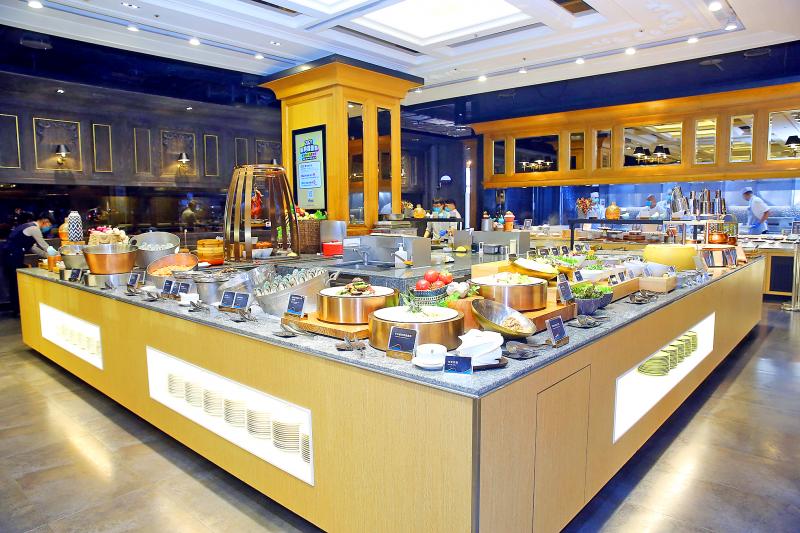Escalating COVID-19 cases are wreaking havoc on the hospitality industry, with occupancy rates in Taipei last week dropping below 20 percent, prompting hotels to roll out cutthroat promotions.
Although health authorities have refrained from raising virus alert levels during this outbreak, people are voluntarily avoiding going out after daily cases reached more than 60,000 last week with no sign of stabilizing.
Popular buffet restaurants Eat Together (饗食天堂), Hilai Restaurant (漢來海港餐廳), Brasserie (柏麗廳) at Regent Taipei (台北晶華酒店) and Recipe (探索廚房) at Le Meridien all suspended afternoon meals this month to reduce their losses.

Photo courtesy of the Feast & Food Gourmet Group
Guestroom staffers have been processing cancelation requests nonstop and might have to introduce unpaid leave if the situation fails to improve soon.
Taiwan is seeking to coexist with COVID-19 like the US, Europe and Southeast Asian countries.
Hotels and restaurants are again bearing the brunt during the transition, as evidenced by sluggish Mother’s Day sales earlier this month, and are expecting sluggish business over the Dragon Boat Festival next month and the summer vacation unless virus infections come under control soon.
Formosa International Hotels Corp (晶華國際酒店集團), My Humble House Group (寒舍集團) and Taoyuan’s Yaward Resort (悅華大酒店) have launched promotions to drive up occupancy rates, while some other hotels said they are encouraging workers to use their annual leave.

Three experts in the high technology industry have said that US President Donald Trump’s pledge to impose higher tariffs on Taiwanese semiconductors is part of an effort to force Taiwan Semiconductor Manufacturing Co (TSMC, 台積電) to the negotiating table. In a speech to Republicans on Jan. 27, Trump said he intends to impose tariffs on Taiwan to bring chip production to the US. “The incentive is going to be they’re not going to want to pay a 25, 50 or even a 100 percent tax,” he said. Darson Chiu (邱達生), an economics professor at Taichung-based Tunghai University and director-general of

‘LEGACY CHIPS’: Chinese companies have dramatically increased mature chip production capacity, but the West’s drive for secure supply chains offers a lifeline for Taiwan When Powerchip Technology Corp (力晶科技) entered a deal with the eastern Chinese city of Hefei in 2015 to set up a new chip foundry, it hoped the move would help provide better access to the promising Chinese market. However, nine years later, that Chinese foundry, Nexchip Semiconductor Corp (合晶集成), has become one of its biggest rivals in the legacy chip space, leveraging steep discounts after Beijing’s localization call forced Powerchip to give up the once-lucrative business making integrated circuits for Chinese flat panels. Nexchip is among Chinese foundries quickly winning market share in the crucial US$56.3 billion industry of so-called legacy

Taiwan Semiconductor Manufacturing Co (TSMC, 台積電) yesterday held its first board of directors meeting in the US, at which it did not unveil any new US investments despite mounting tariff threats from US President Donald Trump. Trump has threatened to impose 100 percent tariffs on Taiwan-made chips, prompting market speculation that TSMC might consider boosting its chip capacity in the US or ramping up production of advanced chips such as those using a 2-nanometer technology process at its Arizona fabs ahead of schedule. Speculation also swirled that the chipmaker might consider building its own advanced packaging capacity in the US as part

A move by US President Donald Trump to slap a 25 percent tariff on all steel imports is expected to place Taiwan-made steel, which already has a 25 percent tariff, on an equal footing, the Taiwan Steel & Iron Industries Association said yesterday. Speaking with CNA, association chairman Hwang Chien-chih (黃建智) said such an equal footing is expected to boost Taiwan’s competitive edge against other countries in the US market, describing the tariffs as "positive" for Taiwanese steel exporters. On Monday, Trump signed two executive orders imposing the new metal tariffs on imported steel and aluminum with no exceptions and exemptions, effective